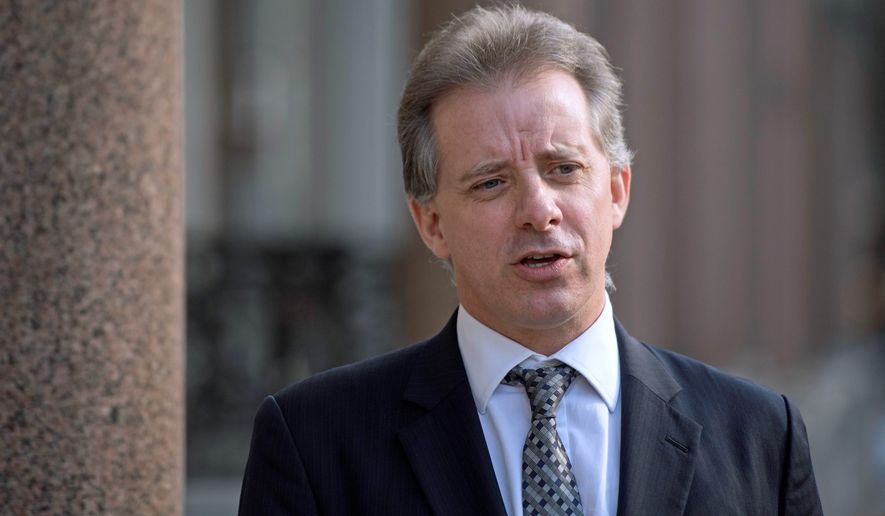A peek inside the BuzzFeed newsroom and the decision-making process of editor Ben Smith is contained in a federal court record in Florida.
The libel case revolves around another Donald Trump story — this one on the infamous dossier that permeated the FBI, politics and journalism but whose core collusion charges remain unconfirmed more than two years after former British intelligence officer Christopher Steele wrote them.
BuzzFeed and Mr. Smith are now under fire from the left and right for reporting last week that President Trump personally ordered his former attorney Michael Cohen to lie to Congress about a defunct Moscow hotel deal. The article was momentous because it accused Mr. Trump of an impeachable offense.
Hours after the article appeared Thursday evening, special counsel Robert Mueller took the rare step of disputing a Trump-Russia story. A spokesman said BuzzFeed’s reporting on statements, witness testimony and documents was “not accurate.”
Mr. Smith and one of the story’s authors stuck by the reporting Sunday and put faith in two “law enforcement” sources.
“We have further confirmation that this is right. We’ve been told to stand our ground,” reporter Anthony Cormier told CNN’s “Reliable Sources.” “Our reporting is going to be borne out to be accurate. We’re 100 percent behind it.”
Likewise, in the decision to publish the raw 35-page, anti-Trump dossier on Jan. 10, 2017, Mr. Smith and his team put complete faith in another source: Mr. Steele. It was learned later that Mr. Steele’s work had been financed by the Hillary Clinton campaign and the Democratic National Committee.
Mr. Smith was sued for libel by Russian entrepreneur Aleksej Gubarev, whom Mr. Steele specifically accused of hacking Democratic Party computers. The Russian vigorously denied the charge. No evidence has surfaced to back up the claim, but the judge threw out the lawsuit and sided with BuzzFeed, which argued that the dossier had become a legitimate news item.
In a court declaration filed in November, Mr. Smith said he initially set out to investigate the dossier and try to determine its veracity. But after CNN published a story that President-elect Trump was briefed on the dossier, Mr. Smith decided to post it instead.
“We also agreed, however, that the story we wanted to report in light of these new developments was not the story we had been investigating up to that point, which was trying to ascertain the truth or falsity of underlying allegations within the Dossier,” Mr. Smith said. “Rather, the story we now wanted to report was a different one, a story explaining to readers what the Dossier was and how it was affecting government actions.”
Ken Bensinger, a BuzzFeed investigative reporter whose byline appeared on the dossier story, also filed a court declaration. He expressed complete faith in Mr. Steele.
“I knew of Christopher Steele and his background as a retired MI6 officer, and I knew his reputation as a source for Russian intelligence to be excellent,” he said. “I believed and continue to believe that Mr. Steele has both the types of sources who could provide him with credible information and the expertise to evaluate it.”
Mr. Bensinger also vouched for David J. Kramer, an associate of the late Sen. John McCain. McCain was one of the few who possessed a hard copy of the dossier in 2016. He provided it to then-FBI Director James B. Comey.
The judge’s decision in the libel lawsuit revealed that Mr. Kramer, a former State Department official, was the mysterious source who delivered the dossier to BuzzFeed.
Mr. Kramer’s name is redacted from Mr. Bensinger’s declaration, but it seems clear he is talking about McCain’s associate. He depicts Mr. Kramer as buying into Mr. Steele’s findings and determining that Mr. Trump was a national security threat.
“It was apparent to me that [Mr. Kramer] had substantial concerns that the President-elect of the United States may have been compromised by the Russian government and believed this presented a potentially grave threat to the national interests of the United States, and indeed the West as a whole,” Mr. Bensinger said.
He said of Mr. Kramer: “Everything about demeanor, expertise, and the substantive things he was saying about Mr. Steele and the memos added to my belief that the memos were credible and important.
“I found it to be very unsettling, particularly in light of what I had learned about it. I believed that Mr. Steele likely had good sources for the information contained in the Dossier and the expertise to credibly assess it. In addition, I believed that [Mr. Kramer] would not have taken it seriously or shared it [with] me without good reason.”
Mr. Bensinger said he was on vacation in Florida when an editor called to say BuzzFeed was posting the dossier.
“I was surprised to hear the news, as I was on vacation and understood that we were still working on reporting on the Dossier,” Mr. Bensinger said.
Today, Republicans consider Mr. Steele’s dossier a hoax sourced to Kremlin operatives and written by a Democratic Party-paid operative who told a Justice Department contact that he was desperate to sink Mr. Trump.
All targeted Trump associates deny Mr. Steele’s allegations of Russian collusion. None has been charged in such a conspiracy in an FBI investigation started 32 months ago.
Mr. Bensinger said he believed the charges against Mr. Gubarev were true because “I also thought the very fact that Mr. Steele had identified with that degree of specificity some of the alleged participants in the hacking scheme spoke to the credibility of those particular allegations.”
In Mr. Gubarev’s libel lawsuit against Mr. Steele in London, the former spy said in a declaration that the information on Mr. Gubarev came from unsolicited call-ins. He did not investigate it further and included the charges in his last memo, in December 2016.
• Rowan Scarborough can be reached at rscarborough@washingtontimes.com.




Please read our comment policy before commenting.